Brian Wilson
Download of
the Month: Early Music
Alexander AGRICOLA (c.1446-1506) Missa in
myne Zyn
Ante Missam: In minen sin [2:15]; Si j'aime mon amy [0:59]
Anonymous Bien soiez venu - Alleluia [1:13]
Alexander AGRICOLA In mynen zin
[1:47]
Ad Missam: Gloria, from Missa In myne Zyn [9:12]
Gilles BINCHOIS (c.1400-1460) Comme
femme desconfortée II [2:23]
Alexander AGRICOLA Credo, from
Missa In myne Zyn [10:17]
Johannes OCKEGHEM (c.1400/1430-1497) D'ung
aultre amer III [1:51]
Alexander AGRICOLA
Sanctus, from Missa In myne Zyn [9:18]
Walter FRYE (fl.c.1450-1470) Tout a
par moy II [2:54]
Alexander AGRICOLA
Agnus Dei, from Missa In myne Zyn [7:36]
Ad Vesperam: Pater meus agricola est [6:49]; Regina cœli [3:07]
Capilla Flamenca (Marnix De Cat, Rob Cuppens (counter-tenors); Tore Denys
(tenor); Lieven Termont (baritone); Dirk Snellings (bass); Liam Fennelly,
Thomas Baete, Piet Stryckers (violas da gamba)/Dirk Snellings
RICERCAR RIC306 [59:41] Ė from eMusic
or Amazon.co.uk
(both mp3)
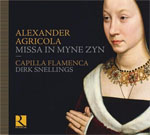 This
is a most enterprising release from Ricercar to get the New Year off to good
effect. Agricola was one of the most prominent of the contemporaries of Josquin
des Prés. His music has not fared as well on record as that of other
talented contemporaries, such as Josquin, Binchois, Ockeghem and even Frye,
whose works included here give us a chance to judge for ourselves that Agricolaís
music is just as worthy as theirs of rediscovery - and that there is no better
place to start than with the inventive Missa In myne Zyn, or In
minen Sin, to give its alternative spelling, based on his own song of
the same title - literally, In my mind. Nor can I imagine a better performance
to do it and the other music here justice.
This
is a most enterprising release from Ricercar to get the New Year off to good
effect. Agricola was one of the most prominent of the contemporaries of Josquin
des Prés. His music has not fared as well on record as that of other
talented contemporaries, such as Josquin, Binchois, Ockeghem and even Frye,
whose works included here give us a chance to judge for ourselves that Agricolaís
music is just as worthy as theirs of rediscovery - and that there is no better
place to start than with the inventive Missa In myne Zyn, or In
minen Sin, to give its alternative spelling, based on his own song of
the same title - literally, In my mind. Nor can I imagine a better performance
to do it and the other music here justice.
Agricola clearly shared the kind of humour that fellow composer Clemens Non
Papa possessed, since he plays on his own name (actually Ackermann, apparently,
meaning farmer, Latin Agricola) in the piece Pater meus agricola
est (My father is a farmer). He was in fact the illegitimate son of a
wealthy Ghent businessman. The eMusic tracks are all at a low bit-rate (one
is even lower than the basic 192kb/s) but sound well enough for all that.
Neither download offers notes: nothing other than the cover shot, based on
a Hans Memling painting, shown again - reversed from the original for some
odd reason - on the Capilla Flamenca website. It really is time that all download
sites followed the example of Hyperion, Chandos (theclassicalshop.net) and
the newer Naxos and some other releases on classicsonline.com in offering
the booklet - in this case including, I understand notes by Fabrice Fitch
- as part of the deal. You'll find a little information on Capilla Flamencaís
website here.
I understand that iTunes offer the booklet of this recording, but their price
is over £2 more expensive than that charged by eMusic (£5.49)
and £1 more than Amazon (£6.99).
Joint Download of the Month
Claude DEBUSSY (1862-1918)
Fantaisie for Piano and Orchestra (à René Chansarel)* [23:59]
Maurice RAVEL (1875-1937)
Concerto in G for Piano and Orchestra (à Marguerite Long)*/** [21:00]
Concerto for the Left Hand for Piano and Orchestra (à Paul Wittgenstein)*
[17:40]
Jules MASSENET (1842-1912)
Deux Impromptus (à mon ami Louis Dièmer) [4:52]
Papillons noirs [1:34]
Papillons blancs [2:41]
Valse folle [2:37]
Jean-Efflam Bavouzet (piano); BBC Symphony Orchestra*/Yan Pascal Tortelier*
Alison Teale (cor anglais) **
rec. Watford Colosseum, April 2010 and Potton Hall, Dunwich, Suffolk, UK,
June 2010. DDD.
CHANDOS CHAN5084 [76:59] Ė from theclassicalshop.net
(mp3, lossless, 24/96 and studio surround)
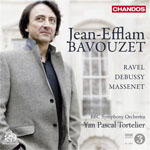 Everything
here is just right - the soloist, the orchestra under the direction of a conductor
at one with the soloist, the recording and the download quality, even in 'ordinary'
lossless sound. I'd already awarded the palm for this month to the Agricola,
but this is equally deserving, especially when Chandos already had a fine
recording of the Ravel Piano Concertos with Louis Lortie and Rafael Frühbeck
de Burgos (CHAN8773 - see May 2009 Roundup).
That earlier recording couples the Ravel concertos with Fauréís Ballade;
the new recording is much more generous, though Chandos canít agree its exact
length: the booklet says 77:00, the download site 76:01. Windows Explorer
disagrees with both, timing the total download at 76:59.
Everything
here is just right - the soloist, the orchestra under the direction of a conductor
at one with the soloist, the recording and the download quality, even in 'ordinary'
lossless sound. I'd already awarded the palm for this month to the Agricola,
but this is equally deserving, especially when Chandos already had a fine
recording of the Ravel Piano Concertos with Louis Lortie and Rafael Frühbeck
de Burgos (CHAN8773 - see May 2009 Roundup).
That earlier recording couples the Ravel concertos with Fauréís Ballade;
the new recording is much more generous, though Chandos canít agree its exact
length: the booklet says 77:00, the download site 76:01. Windows Explorer
disagrees with both, timing the total download at 76:59.
The Debussy Fantaisie - effectively a Piano Concerto - adds greatly
to the appeal of the new release; though the piano solo works at the end seem
less relevant, they, too, are well played.
Those in determined search of a bargain will find Anne Queffélec and
Alain Lombard in the Debussy/Ravel coupling on Warner Apex for around £5.
Everyone else should go for the new Chandos.
Bargain of the Month
Robert SCHUMANN (1810-1856) Complete Piano Music
- Volume 1
Symphonic Etudes ('Etudes in the form of variations'), Op.13 [25:38]
5 Symphonic Etudes, supplement, Op.posth [13:56]
Toccata, Op.7 [7:14]
Canon 'an Alexis', Op.posth [0:57]
Arabesque in C Major, Op.18 [6:06]
Carnaval, Op.9 [30:32]
Faschingsschwank aus Wien [22:00]
Album für die Jugend (Album for the Young), Op.68 [65:56]
Neue Album für die Jugend (A New Album for the Young), Op.posth.
[6:34]
Peter Frankl (piano) - rec. 1960s. ADD.
VOX ED-5185 [178:53] Ė from Amazon.co.uk
(mp3)
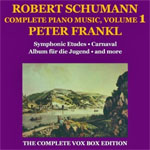 These
are vintage performances which were well worth reissuing, especially if you
like your Schumann to be a little Ďcoolerí than usual. At £6.99 for
almost three hours of music, this is a wonderful, nay, irresistible, bargain.
The Amazon mp3 sound is good at 256kb/s - much brighter and clearer than I
recall from the Turnabout reissues of the 1970s - but, if you insist on the
highest bit-rate, HMV Digital have it for £7.99. Donít even contemplate
buying it from eMusic - their policy of charging by the track - 99 in this
case - leads to an absurd price of £41.58!
These
are vintage performances which were well worth reissuing, especially if you
like your Schumann to be a little Ďcoolerí than usual. At £6.99 for
almost three hours of music, this is a wonderful, nay, irresistible, bargain.
The Amazon mp3 sound is good at 256kb/s - much brighter and clearer than I
recall from the Turnabout reissues of the 1970s - but, if you insist on the
highest bit-rate, HMV Digital have it for £7.99. Donít even contemplate
buying it from eMusic - their policy of charging by the track - 99 in this
case - leads to an absurd price of £41.58!
There are four more volumes in the series, each containing around 3 hours
of music. Amazon also have shorter, single CD selections from this series
for those who donít like to bite off large chunks, at £4.99 each. Volume
1 in this form contains Album für die Jugend and Neue Album
für die Jugend, 72 minutes. Those seeking more of Peter Franklís
Schumann will find his version of the Piano Quintet with the Lindsay
Quartet, generously coupled with the Brahms Piano Quintet, on ASV from Passionato.com
(mp3 and lossless).
William BYRD (1543-1623) O You That Hear
This Voice
Trinity Consort/Clare Wilkinson - rec. 1998. DDD.
BEULAH EXTRA 1BX120 [1:55] Ė from Beulah
(mp3)
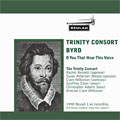 This
is a short excerpt from the album O Sprite Heroic, settings of the
words of that consummate Elizabethan, Sir Philip Sidney, author of Arcadia
and hero of the English campaign in the Netherlands, by Byrd and his contemporaries,
formerly available on CD (1RF2) and available to download from iTunes. I presume
that the other items from this attractive album will follow, though there
are many highly recommendable Byrd recordings.
This
is a short excerpt from the album O Sprite Heroic, settings of the
words of that consummate Elizabethan, Sir Philip Sidney, author of Arcadia
and hero of the English campaign in the Netherlands, by Byrd and his contemporaries,
formerly available on CD (1RF2) and available to download from iTunes. I presume
that the other items from this attractive album will follow, though there
are many highly recommendable Byrd recordings.
Joseph HAYDN (1732-1809)
Symphony No 93 in D [23:15]
Symphony No 94 in G (íSurprise') [23:26]
Symphony No 95 in c minor [18:40]
The Hanover Band/Roy Goodman (1799 Broadwood fortepiano)
HYPERION HELIOS CDH55126 [65:32] Ė from Hyperion
(mp3 and lossless)
Wolfgang Amadeus MOZART (1756-1791)
Divertimento No 10 in F, K247 [31:27]
Divertimento No 17 in D, K334 [44:06]
The Gaudier Ensemble (Marieke Blankestijn, Lesley Hatfield (violins); Iris
Juda (viola); Stephen Williams (double bass); Jonathan Williams, Christiaan
Boers (horns))
HYPERION CDA67386 [74:35] Ė from Hyperion (mp3
and lossless)
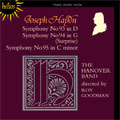 What
do we reviewers have to do to convince our readers that a particular recording
is first-class? Clearly, itís more than we are currently doing because these
two excellent recordings have recently fallen into Hyperionís doldrums, their
'please buy me' slot for recordings which no-one has bought for a long time.
The CDs wonít still be there at half price by the time that you read this
review, but the regular download prices of £5.99 and £7.99 respectively,
in both mp3 and lossless format,
What
do we reviewers have to do to convince our readers that a particular recording
is first-class? Clearly, itís more than we are currently doing because these
two excellent recordings have recently fallen into Hyperionís doldrums, their
'please buy me' slot for recordings which no-one has bought for a long time.
The CDs wonít still be there at half price by the time that you read this
review, but the regular download prices of £5.99 and £7.99 respectively,
in both mp3 and lossless format, 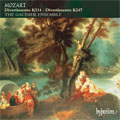 are
attractive. Only an aversion to having Haydn directed (unobtrusively) from
the keyboard could possibly deter you: it certainly doesnít deter me, even
though I got to know Nos. 93 and 94 from Beechamís inauthentic but delightful
mono recordings - I wish the Goodman series had lasted long enough to include
No.98, where the keyboard is essential in the finale. The Mozart is lighter-weight
but delectable. Please donít let either of these recordings become orphaned
again.
are
attractive. Only an aversion to having Haydn directed (unobtrusively) from
the keyboard could possibly deter you: it certainly doesnít deter me, even
though I got to know Nos. 93 and 94 from Beechamís inauthentic but delightful
mono recordings - I wish the Goodman series had lasted long enough to include
No.98, where the keyboard is essential in the finale. The Mozart is lighter-weight
but delectable. Please donít let either of these recordings become orphaned
again.
Wolfgang Amadeus MOZART (1756-1791)
Concerto for Piano and Orchestra No. 22 in E-flat, K482 [35:46]
(cadenzas: Paul Badura-Skoda)
Concerto for Piano and Orchestra No. 18 in B-flat, K456 [30:24]
Northern Sinfonia/Imogen Cooper (Piano/Director); Bradley Creswick (Leader/Co-Director)
rec. The Sage, Gateshead, UK, November 2009. DDD..
AVIE AV2200 [66:22] Ė from classicsonline.com
or eMusic
(mp3) or stream from the Naxos Music Library
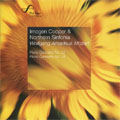 Having
greatly enjoyed the earlier recording of Piano Concertos Nos. 9 and 23 by
the same forces (AV2100), I was initially a little disappointed by
the rather heavy opening of the first movement of K482, but matters soon improved
to the extent that I can recommend this, like the earlier recording, as an
ideal half-way house between full-blown period performance and larger-scale
modern-instrument versions.
Having
greatly enjoyed the earlier recording of Piano Concertos Nos. 9 and 23 by
the same forces (AV2100), I was initially a little disappointed by
the rather heavy opening of the first movement of K482, but matters soon improved
to the extent that I can recommend this, like the earlier recording, as an
ideal half-way house between full-blown period performance and larger-scale
modern-instrument versions.
The classicsonline download (£7.99) comes at the full 320kb/s and includes
the booklet, which is also available to subscribers to the Naxos Music Library.
The less expensive eMusic (£2.52) is, as usual at varying bit-rates,
with only one track at 320k and others as low as 224k, though the sound is
never less than acceptable, and there is no booklet.
Piano Concerto No.23 in A, K488
Clifford Curzon (piano); National Symphony Orchestra/Boyd Neel - rec. 1945.
ADD/mono
BEULAH EXTRA 1BX101-3BX101 [24:38] Ė from Beulah
(mp3)
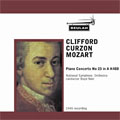 Beulah
have already given us a recommendable reissue of Dennis Matthews and Rudolf
Schwarz in this concerto (1BX42 - see November 2010 Roundup)
and Curzonís much later stereo recordings of Nos. 20, 23, 24, 26 and 27 with
István Kertesz are available on a 2-CD Decca Legends album (468 4912
- download from Passionato.com here).
There is still a place for a performance as fine as this, however, with Boyd
Neel on fine form as conductor, as he also was with Kathleen Long in Mozart
at around the same time, and a recording which preserves all the essentials
in an excellent transfer which made me forget its age.
Beulah
have already given us a recommendable reissue of Dennis Matthews and Rudolf
Schwarz in this concerto (1BX42 - see November 2010 Roundup)
and Curzonís much later stereo recordings of Nos. 20, 23, 24, 26 and 27 with
István Kertesz are available on a 2-CD Decca Legends album (468 4912
- download from Passionato.com here).
There is still a place for a performance as fine as this, however, with Boyd
Neel on fine form as conductor, as he also was with Kathleen Long in Mozart
at around the same time, and a recording which preserves all the essentials
in an excellent transfer which made me forget its age.
Curzonís Mozart, even in the 1968 remake, may seem dated, with little attempt
to decorate the printed notes, but in other respects his interpretation is
timeless and, in its own way, as enjoyable as the more recent Imogen Cooper
performance (see above), especially in the delicately-handled slow movement.
The performance is a little faster in general than the Matthews - and, indeed,
than Curzon himself in 1968 - but never at the expense of the music.
Piano Concerto No.24 in c minor, K491 (cadenzas by Hummel)
Kathleen Long (piano); Concertgebouw Orchestra/Eduard van Beinum - rec.1948.
ADD/mono
BEULAH EXTRA 1BX105-3BX105 [23:03] Ė from Beulah (mp3)
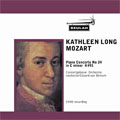 This
makes a fine pendant to the Curzon version of No. 23. One contemporary reviewer
described the original release as satisfying, sensitive and a welcome change
from over-powered performances. Itís a judgement which remains true. Thereís
delicacy here, but not the fragile delicacy which used sometimes to be attributed
to Mozart. The recording is very good for its age - sounding more like an
early LP - and the transfer is of Beulahís usual high quality, with just the
occasional slight click and a slightly muffled sound in tutti to remind us
of the 78s provenance. May we have more of Longís Mozart, please?
This
makes a fine pendant to the Curzon version of No. 23. One contemporary reviewer
described the original release as satisfying, sensitive and a welcome change
from over-powered performances. Itís a judgement which remains true. Thereís
delicacy here, but not the fragile delicacy which used sometimes to be attributed
to Mozart. The recording is very good for its age - sounding more like an
early LP - and the transfer is of Beulahís usual high quality, with just the
occasional slight click and a slightly muffled sound in tutti to remind us
of the 78s provenance. May we have more of Longís Mozart, please?
Ludwig van BEETHOVEN (1770-1827) Symphony
No.5 in c minor
Berlin Philharmonic Orchestra/André Cluytens - rec.1958. ADD/stereo.
BEULAH EXTRA 5BX82-7BX82 [32:55] Ė from Beulah (mp3)
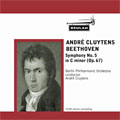 I
canít do better than repeat a recommendation that appeared back in 1959. Trevor
Harvey was one of those reviewers whose opinions always seemed spot-on at
the time when I was beginning to build a classical collection. He referred
to it as a strong performance: one of the best things he had ever heard Cluytens
do. 'It seeks to make no efforts, but by very virtue of its honest strength
ends by making a great impression. In its stereo form it is again a success.'
I
canít do better than repeat a recommendation that appeared back in 1959. Trevor
Harvey was one of those reviewers whose opinions always seemed spot-on at
the time when I was beginning to build a classical collection. He referred
to it as a strong performance: one of the best things he had ever heard Cluytens
do. 'It seeks to make no efforts, but by very virtue of its honest strength
ends by making a great impression. In its stereo form it is again a success.'
By 1967 it had shed its Coriolan Overture coupling, been generously re-coupled
with Symphony No.8, come down in price on the HMV Concert Classics label,
had thereby come within my price bracket (£1 2s 9d - about £20
in modern values) and entered my collection, relying on THís original praise
as against Robert Laytonís opinion that the performance was 'a little too
faceless'. I'd just lost my copy of Klempererís 10" mono performance
- or, rather, the person to whom I'd loaned it had lost it - the memory of
which is still in many ways my benchmark, along with Carlos Kleiber (DG Originals
447 0002, with Symphony No.7).
I wouldnít place Cluytens in quite the same bracket as that mono Klemperer
or the Kleiber, but this reissue reminds me why I kept its Concert Classics
reincarnation in my collection till the end of the LP era. Cluytens' accompaniments
of Beethoven concertos with the likes of Clara Haskil, Friedrich Gulda, Solomon
and David Oistrakh have survived in the CD catalogue along with his account
of the Pastoral Symphony, also to be available from Beulah (8BX82-10BX82,
due in February), as is his Ninth already (1BX82-4BX82 - see December
2010 Download Roundup)
and this version of the Fifth is equally deserving.
Gioachino ROSSINI (1792-1868) Tancredi
Overture
National Symphony Orchestra/Victor Olof - rec.1945. ADD/mono
BEULAH EXTRA 1BX103 [6:34] Ė from Beulah
(mp3)
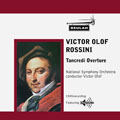 This
sounds more dated than the other 1945 recordings on offer from Beulah this
month: overall its rather sub-fusc sound places it just beyond comfortable
listening for me and the lively performance didnít make sufficient amends.
Olofís recording of the William Tell Overture might have been preferable.
This
sounds more dated than the other 1945 recordings on offer from Beulah this
month: overall its rather sub-fusc sound places it just beyond comfortable
listening for me and the lively performance didnít make sufficient amends.
Olofís recording of the William Tell Overture might have been preferable.
Franz SCHUBERT (1797-1828)
Symphony No.8 in b minor, D759 ('Unfinished') [20:14]
Symphony No.3 [21:08]
Pittsburgh Symphony Orchestra/William Steinberg - rec.1961. ADD. From Command
Classics reel-to-reel tape.
HIGH DEFINITION TAPE TRANSFERS HDCD217 [41:22] Ė from HDTT
(24/96 lossless)
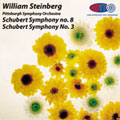 Steinberg
takes the opening movement of the Unfinished at about the usual pace.
Thatís a little too slow for my liking, since it effectively makes the symphony
a work of two slow movements, but he compensates by keeping the momentum going,
which is more important than mere tempo. In any case, he comes closer to the
allegro moderato marking than Fistoulari on Beulah Extra 2BX37-3BX37 (see
October 2010 Download Roundup). On the other hand, Fistoulari compensates
with a lightness of touch that Steinbergís more dramatic interpretation eschews.
Thereís room for both, but HDTTís transfer of the Steinberg recording is one
of their real marvels; though Beulah have done their best with the Fistoulari,
thereís a world of difference between 1944 mono and 1961 stereo in full-bodied
24/96 format.
Steinberg
takes the opening movement of the Unfinished at about the usual pace.
Thatís a little too slow for my liking, since it effectively makes the symphony
a work of two slow movements, but he compensates by keeping the momentum going,
which is more important than mere tempo. In any case, he comes closer to the
allegro moderato marking than Fistoulari on Beulah Extra 2BX37-3BX37 (see
October 2010 Download Roundup). On the other hand, Fistoulari compensates
with a lightness of touch that Steinbergís more dramatic interpretation eschews.
Thereís room for both, but HDTTís transfer of the Steinberg recording is one
of their real marvels; though Beulah have done their best with the Fistoulari,
thereís a world of difference between 1944 mono and 1961 stereo in full-bodied
24/96 format.
The Third Symphony is one of those works over which Beecham waved his
magic wand so effectively that no other version seems able to match it (EMI
5669842, with Nos. 5 and 6). Steinberg comes about as close anyone, however.
In neither work could you be under any illusion that Steinberg was using an
orchestra anything like the size that Schubert would have expected, but the
same is true of Beechamís RPO: both employ their forces with delicacy.
Felix MENDELSSOHN (1809-1847) Violin Concerto
Alfredo Campoli (violin); London Philharmonic Orchestra/Sir Adrian Boult
- rec.1958. ADD/binaural.
BEULAH EXTRA 5BX10-6BX10 [26:24] Ė from Beulah
(mp3)
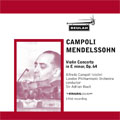 Alfredo
Campoli was something of a pluralist in recording the Mendelssohn Violin
Concerto. Beulah already have his 1949 recording with Eduard van Beinum
(4PD10, with Elgar - see review).
This 1958 recording with Boult at the helm was last reissued on LP on the
budget Eclipse label in its original partnership with Bruchís Scottish
Fantasia. Beulah have already reissued this pairing on CD (7PD10, with
Saint-Saëns Havanaise - see review)
- may we have the Scottish Fantasia as a Beulah Extra download, too,
please?
Alfredo
Campoli was something of a pluralist in recording the Mendelssohn Violin
Concerto. Beulah already have his 1949 recording with Eduard van Beinum
(4PD10, with Elgar - see review).
This 1958 recording with Boult at the helm was last reissued on LP on the
budget Eclipse label in its original partnership with Bruchís Scottish
Fantasia. Beulah have already reissued this pairing on CD (7PD10, with
Saint-Saëns Havanaise - see review)
- may we have the Scottish Fantasia as a Beulah Extra download, too,
please?
The performance is still competitive in a highly competitive market, with
the emphasis on beauty rather than showing-off, and the sound remains much
more than acceptable despite the over-prominence of the solo violin. Itís
not a major problem, and it was about par in the 1950s, when most were still
listening in mono and, lacking the spatial separation which stereo supplies,
would have expected the forward recording of the soloist. I sat back and enjoyed
this immensely.
Franz LISZT (1811-1886) Hungarian Rhapsody
No.2 (arr. Muller-Berghaus)
Orchestre de la Société des Concerts du Conservatoire de Paris/Albert
Wolff - rec. 1954. ADD/mono
BEULAH EXTRA 1BX98 [10:08] Ė from Beulah (mp3)
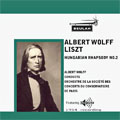 Prepare
for an avalanche of Liszt new- and re-issues in 2011. Itís good to start the
year with this reissue of part of an early 10" LP recording from Albert
Wolff. There are no fresh insights in the performance - turn to modern recordings
such as those by Iván Fischer on Philips 456 5702* for those - but
this is enjoyable. What was described in 1956 as 'notably good recording'
now sounds a trifle thin at the top of the frequency range.
Prepare
for an avalanche of Liszt new- and re-issues in 2011. Itís good to start the
year with this reissue of part of an early 10" LP recording from Albert
Wolff. There are no fresh insights in the performance - turn to modern recordings
such as those by Iván Fischer on Philips 456 5702* for those - but
this is enjoyable. What was described in 1956 as 'notably good recording'
now sounds a trifle thin at the top of the frequency range.
* Download only, from Passionato.com.
Ambroise THOMAS (1811-1896) Mignon
Overture
National Symphony Orchestra/Anatole Fistoulari - rec.1945. ADD/mono
BEULAH EXTRA 5BX7 [8:21] - from Beulah (mp3)
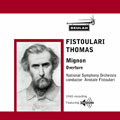 This
is Thomasí anniversary year, though heís likely to be swamped by Liszt and
Mahler celebrations. The once-famous and tuneful Mignon Overture has
rather fallen out of currency, so itís good to have this attractive Fistoulari
recording restored by Beulah in a very fine transfer, which sounds almost
like a mid-1950s LP at the start; though the 78 origin is apparent later on,
the sound is not so thin as to preclude enjoyment and there is almost no surface
noise.
This
is Thomasí anniversary year, though heís likely to be swamped by Liszt and
Mahler celebrations. The once-famous and tuneful Mignon Overture has
rather fallen out of currency, so itís good to have this attractive Fistoulari
recording restored by Beulah in a very fine transfer, which sounds almost
like a mid-1950s LP at the start; though the 78 origin is apparent later on,
the sound is not so thin as to preclude enjoyment and there is almost no surface
noise.
Charles GOUNOD (1818-1893) Faust
Ballet Music
National Symphony Orchestra/Anatole Fistoulari - rec.1945. ADD/mono
BEULAH EXTRA 4BX7 [16:14] - from Beulah (mp3)
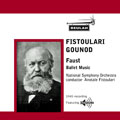 There
are not too many recordings of this ballet music around today, and most of
the handful that exist are elderly, including the Alexander Gibson which I
reviewed some time ago. (Witchesí Brew, Decca Eloquence 442 9985 -
see review).
Fistoulari offers an attractive, often exciting performance in decent sound.
Better than either Fistoulari or Gibson, however, Beechamís recording of French
Ballet Music, still available on EMI Great Recordings, has been re-reissued
at an even lower price on EMI Masters. (6318162 - see review
- download from HMV
Digital for £5.99, or purchase on CD for just a few pence more.)
There
are not too many recordings of this ballet music around today, and most of
the handful that exist are elderly, including the Alexander Gibson which I
reviewed some time ago. (Witchesí Brew, Decca Eloquence 442 9985 -
see review).
Fistoulari offers an attractive, often exciting performance in decent sound.
Better than either Fistoulari or Gibson, however, Beechamís recording of French
Ballet Music, still available on EMI Great Recordings, has been re-reissued
at an even lower price on EMI Masters. (6318162 - see review
- download from HMV
Digital for £5.99, or purchase on CD for just a few pence more.)
Camille SAINT-SAËNS (1835-1921) Introduction
and Rondo Capriccioso
Ida Haendel (violin); National Symphony Orchestra/Basil Cameron - rec.1945.
ADD/mono
BEULAH EXTRA 1BX104 [8:44] Ė from Beulah (mp3)
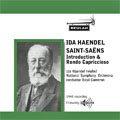 This
is another of those once-popular pieces that donít get trotted out too often
these days, but deserves to be heard. One reviewer in 1946 thought the performance
Ďquite excitingí and the recording full-bodied but a little harsh. What sounded
full-bodied then sounds thin now, but perfectly acceptable: the Ďharshnessí
is no worse than one would expect for the period, and Haendelís well-supported
performance offers strong advocacy for the music.
This
is another of those once-popular pieces that donít get trotted out too often
these days, but deserves to be heard. One reviewer in 1946 thought the performance
Ďquite excitingí and the recording full-bodied but a little harsh. What sounded
full-bodied then sounds thin now, but perfectly acceptable: the Ďharshnessí
is no worse than one would expect for the period, and Haendelís well-supported
performance offers strong advocacy for the music.
Pyotr Ilyich TCHAIKOVSKY (1840-1893) Violin
Concerto
Ida Haendel (violin); National Symphony Orchestra/Basil Cameron - rec.1945.
ADD/mono
BEULAH EXTRA 2BX104 [31:10] - from Beulah
(mp3)
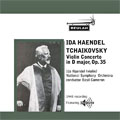 Ida
Haendel made many more concerto recordings after 1945, including at least
two remakes still available of the Tchaikovsky, one from the archives of Stuttgart
Radio (Hänssler 94205, with DvořŠk) and another with the LSO and
Sergiu Celibidache (Testament SBT1038, with Brahms). Later still she recorded
the work for EMI with Berglund, but that recording seems to be out of the
catalogue. This 1945 version is just as fine as the Saint-Saëns (above)
which she recorded at much the same time and with the same decent orchestral
support and sympathetic conducting from Basil Cameron. Once again, the performances
do the music proud - though this concerto didnít need as much advocacy as
the Saint-Saëns - in a decent recording: just donít expect too much from
it, though the violin is loud and clear, and the transfer, as always with
Beulah, is clear and largely free from surface noise.
Ida
Haendel made many more concerto recordings after 1945, including at least
two remakes still available of the Tchaikovsky, one from the archives of Stuttgart
Radio (Hänssler 94205, with DvořŠk) and another with the LSO and
Sergiu Celibidache (Testament SBT1038, with Brahms). Later still she recorded
the work for EMI with Berglund, but that recording seems to be out of the
catalogue. This 1945 version is just as fine as the Saint-Saëns (above)
which she recorded at much the same time and with the same decent orchestral
support and sympathetic conducting from Basil Cameron. Once again, the performances
do the music proud - though this concerto didnít need as much advocacy as
the Saint-Saëns - in a decent recording: just donít expect too much from
it, though the violin is loud and clear, and the transfer, as always with
Beulah, is clear and largely free from surface noise.
Maurice RAVEL (1875-1937) Ma Mère
l'Oye (Mother Goose) Suite
National Symphony Orchestra/Sidney Beer - rec.1945. ADD/mono.
BEULAH EXTRA 1BX102 [17:58] Ė from Beulah
(mp3)
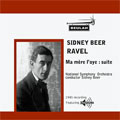 ĎUnauthoritative
and unimaginativeí but recorded in some of Deccaís best pre-LP sound, was
a contemporary verdict on this when comparison was made with the rival Ansermet
recording. Sidney Beer was the founder of the National Symphony Orchestra,
which consisted mainly of musicians from the RAF and other service bands,
who feature on several Beulah Extra releases this month. The Suite opens magically
enough and, though the playing occasionally sounds somewhat routine, I enjoyed
the performance. Though nowadays we're used to hearing the complete ballet,
which is about half as long again, this is well worth having at the modest
asking price. The recording is excellent for its age and the transfer is free
of 78 noise. Of the many very fine modern recordings of the complete ballet,
Dutoitís with the Montréal Symphony Orchestra (Decca Gramophone Awards
475 0432) is probably the one to recommend: download from Passionato.com
in mp3 or lossless. The Dutoit is also available in mp3 only on a 2-CD Ravel
collection, Double Decca 460 2142, again from Passionato.com.
(On offer at £5.99 at the time of writing).
ĎUnauthoritative
and unimaginativeí but recorded in some of Deccaís best pre-LP sound, was
a contemporary verdict on this when comparison was made with the rival Ansermet
recording. Sidney Beer was the founder of the National Symphony Orchestra,
which consisted mainly of musicians from the RAF and other service bands,
who feature on several Beulah Extra releases this month. The Suite opens magically
enough and, though the playing occasionally sounds somewhat routine, I enjoyed
the performance. Though nowadays we're used to hearing the complete ballet,
which is about half as long again, this is well worth having at the modest
asking price. The recording is excellent for its age and the transfer is free
of 78 noise. Of the many very fine modern recordings of the complete ballet,
Dutoitís with the Montréal Symphony Orchestra (Decca Gramophone Awards
475 0432) is probably the one to recommend: download from Passionato.com
in mp3 or lossless. The Dutoit is also available in mp3 only on a 2-CD Ravel
collection, Double Decca 460 2142, again from Passionato.com.
(On offer at £5.99 at the time of writing).
AntonŪn DVOŘŃK (1841-1904)
Symphony No.6 in D, Op.60 [45:35]
Nocturne in B, Op.40 [7:38]
Scherzo capriccioso, Op.66 [15:04]
Baltimore Symphony Orchestra/Marin Alsop - rec. live, March 2008 and March
2009. DDD.
NAXOS 8.570995 [68:19] Ė from classicsonline.com
(mp3)
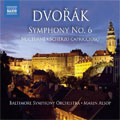 Having
praised Marin Alsopís version of the New World Symphony (8.570714)
and been slightly sniffy about her coupling of Nos. 7 and 8 (8.572112), Iím
happy to report that sheís back on track here. I usually concur with the view
that DvořŠkís Sixth Symphony contains distinct echoes of Brahms,
but Alsop also reminds us of the workís Czech credentials even more than Sir
Charles Mackerras with the Czech Philharmonic on Supraphon (SU37712 - from
eMusic,
mp3). Much as I enjoyed this new Naxos release, however, Iím still going to
rate that Mackerras recording as equally, if not even more, essential. Choice
of coupling could be your deciding factor: a wonderful account of The Golden
Spinning Wheel on Supraphon against the wonderfully ebullient Scherzo
Capriccioso and the Nocturne here. Though the performances were
recorded live, the Baltimore audience is mercifully un-bronchitic.
Having
praised Marin Alsopís version of the New World Symphony (8.570714)
and been slightly sniffy about her coupling of Nos. 7 and 8 (8.572112), Iím
happy to report that sheís back on track here. I usually concur with the view
that DvořŠkís Sixth Symphony contains distinct echoes of Brahms,
but Alsop also reminds us of the workís Czech credentials even more than Sir
Charles Mackerras with the Czech Philharmonic on Supraphon (SU37712 - from
eMusic,
mp3). Much as I enjoyed this new Naxos release, however, Iím still going to
rate that Mackerras recording as equally, if not even more, essential. Choice
of coupling could be your deciding factor: a wonderful account of The Golden
Spinning Wheel on Supraphon against the wonderfully ebullient Scherzo
Capriccioso and the Nocturne here. Though the performances were
recorded live, the Baltimore audience is mercifully un-bronchitic.
Gustav MAHLER (1860-1911) Symphony No.1
('Titan')
National Youth Orchestra of Canada/Georg Tintner - rec. live. Date? DDD?
NAXOS Tintner Edition 8.70022 [58:03] Ė from classicsonline.com
(mp3)
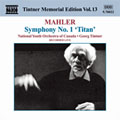 This
album is available for streaming (from the Naxos Music Library - here)
and download only. There need be no worries about the playing of the Canadian
Youth Orchestra, but the opening of this performance is just too quiet and
lacking exuberance to be competitive. True, the initial marking is langsam,
schleppend, but Tintner just never gets underway properly, though the
climactic outburst at the end is all the more effective for that, even a little
too frenzied. I wasnít surprised to find this Naxos recording almost two minutes
longer overall than Kubelík, whose DG Original version (449 7352) remains
my benchmark. The second movement is much better paced, but there are a few
too many changes of gear. The last two movements also exhibit a tendency to
sound episodic - not a serious matter, but Kubelík hides the joins
much better.
This
album is available for streaming (from the Naxos Music Library - here)
and download only. There need be no worries about the playing of the Canadian
Youth Orchestra, but the opening of this performance is just too quiet and
lacking exuberance to be competitive. True, the initial marking is langsam,
schleppend, but Tintner just never gets underway properly, though the
climactic outburst at the end is all the more effective for that, even a little
too frenzied. I wasnít surprised to find this Naxos recording almost two minutes
longer overall than Kubelík, whose DG Original version (449 7352) remains
my benchmark. The second movement is much better paced, but there are a few
too many changes of gear. The last two movements also exhibit a tendency to
sound episodic - not a serious matter, but Kubelík hides the joins
much better.
The audience is remarkably quiet, apart from the (extended and enthusiastic)
applause which follows the spirited finale. The mp3 sound is good, but the
Kubelík also wears its years lightly, comes with a wonderful bonus
- Fischer-Dieskau in the Lieder eines fahrenden Gesellen - and is on
offer as I write for £5.99 from Passionato. If you want the symphony
with the Blumine movement restored, try one of the two recordings which
I reviewed in the June 2010 Roundup.
Symphony No.4 in G [57:05]
Sarah Fox (soprano); Philharmonia Orchestra/Sir Charles Mackerras
rec. live, Queen Elizabeth Hall, London, February 2006. DDD.
SIGNUM SIGCD219 [57:05] - availability: see below.
Subscribers to eMusic
will find this recording available for just £1.68. For others, the least
expensive way to download it - in top-flight 320kb/s mp3, too - is from
hmvdigital.com at £3.16. Unfortunately, both downloads contained
a flaw in the form of a loud noise at the end of three of the movements, especially
the third, so I canít recommend it until the problem is fixed. Itís a shame
that these flaws mar an otherwise excellent performance.
Frederick DELIUS (1862-1934)
Irmelin: Prelude [4:48]
Koanga, Act II: La Calinda (arr. E. Fenby) [4:37]
A Village Romeo and Juliet: The Walk to Paradise Garden [11:34]
Fennimore and Gerda: Intermezzo (arr. E. Fenby) [5:33]
Violin Concerto [27:31]
2 Pieces for Small Orchestra: No. 1. On Hearing the First Cuckoo in Spring
[7:53]
No. 2. Summer Night on the River [6:18]
Sleigh Ride [6:28]
Philippe Djokic (violin); Symphony Nova Scotia/Georg Tintner - rec. December,
1991. DDD.
NAXOS Tintner Edition 8.557242 [74:50] Ė from classicsonline.com
(mp3)
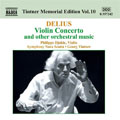 I
hadnít associated Georg Tintner with Delius - or, for that matter, with some
of the other music offered by Naxos in this commemorative series. If we think
that only British conductors can do credit to British music, that is to forget
Monteuxís Elgar (Enigma Variations, Decca) or Karajanís Holst (Planets,
Decca, coupled with the Monteux on 452 3032 or with Straussís Don Juan,
The Originals 475 8225, and DG Karajan Gold 439 0112). Tintnerís Delius is
not quite in that category, but I have to say that he makes a very credible
and creditable case for all the music on this generously-timed album. If you'd
played it to me blind and told me that these were lost Beecham, Barbirolli
or Handley recordings, I might well have believed you. Itís not as if there
was much competition in the Violin Concerto - notably from Pougnet
and Beecham (1949) on Naxos Historical (8.111006) - though itís not in the
same league as the concertos for Cello and Violin and Cello, itís well worth
hearing. The recording, made in a church in Halifax, Nova Scotia, offers a
believable sound-picture.
I
hadnít associated Georg Tintner with Delius - or, for that matter, with some
of the other music offered by Naxos in this commemorative series. If we think
that only British conductors can do credit to British music, that is to forget
Monteuxís Elgar (Enigma Variations, Decca) or Karajanís Holst (Planets,
Decca, coupled with the Monteux on 452 3032 or with Straussís Don Juan,
The Originals 475 8225, and DG Karajan Gold 439 0112). Tintnerís Delius is
not quite in that category, but I have to say that he makes a very credible
and creditable case for all the music on this generously-timed album. If you'd
played it to me blind and told me that these were lost Beecham, Barbirolli
or Handley recordings, I might well have believed you. Itís not as if there
was much competition in the Violin Concerto - notably from Pougnet
and Beecham (1949) on Naxos Historical (8.111006) - though itís not in the
same league as the concertos for Cello and Violin and Cello, itís well worth
hearing. The recording, made in a church in Halifax, Nova Scotia, offers a
believable sound-picture.
Classicsonline offer mp3 only, Passionato lossless, but, for reasons which
I canít fathom, Passionato are charging £6.99 and £8.99 (mp3 and
lossless respectively) for the Tintner Edition CDs, thereby making them considerably
more expensive than from the 'home' site of Naxos at classicsonline (£4.99)
and, even in mp3, more expensive than the physical CDs (typically £5-£6).
The classicsonline version comes complete with booklet.
The same recording seems to be available on the CBC label from eMusic at £3.36
or less.
Howard Hanson Conducts
John Alden CARPENTER (1876-1951) Adventures
in a Perambulator (1914) [27:21]
Roger SESSIONS (1896-1985) The Black Maskers
(1923? 1928?) [21:48]
Charles IVES (1874-1954) Symphony No.3
(1904, first perf. 1946) [20:45]
Eastman-Rochester Orchestra/Howard Hanson - rec.1956/7. ADD. From Mercury
reel-to-reel tapes.
HIGH DENSITY TAPE TRANSFERS HDCD216 [69:54] Ė from HDTT
(24/96 lossless)
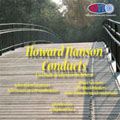 The
major work here is Ivesí Third Symphony, which receives a performance
to rival the version by Neville Marriner (Decca Originals 475 8237) which
I recommended some time ago (see August 2009 Download
Roundup). The coupling there is Barberís Adagio, Coplandís Quiet
City and works by Cowell and Creston, but the two less familiar items
on this HDTT reissue were well worth reviving. Performances are idiomatic
- the Ives benefits from being generally just a mite faster than from Marriner,
so those who find that a touch too refined should be happy - and the 24/96
transfer has opened out the sound to an extent that it is competitive with
the much more recent Decca: itís just a trifle drier than its rival.
The
major work here is Ivesí Third Symphony, which receives a performance
to rival the version by Neville Marriner (Decca Originals 475 8237) which
I recommended some time ago (see August 2009 Download
Roundup). The coupling there is Barberís Adagio, Coplandís Quiet
City and works by Cowell and Creston, but the two less familiar items
on this HDTT reissue were well worth reviving. Performances are idiomatic
- the Ives benefits from being generally just a mite faster than from Marriner,
so those who find that a touch too refined should be happy - and the 24/96
transfer has opened out the sound to an extent that it is competitive with
the much more recent Decca: itís just a trifle drier than its rival.
If you listen via Squeezebox or similar player, you may find that the first
movement of the Ives follows a little too hard on the heels of the Sessions,
with a gap of just 4 seconds.
My colleague Dan Morgan has also been listening to the Ives:
Leonard Bernsteinís recording of Ivesís Third Symphony - available
as part of a 60-CD set from Sony* - is a wonderful tribute to two musical
mavericks. On first hearing Hansonís performance isnít in the same league
musically, but in terms of sound the homespun melodies of Old Folks Gatheriní
emerge with a warmth and amplitude that is most impressive. And even though
the Eastman-Rochester band arenít in the front-rank they play with commendable
feeling throughout. Indeed, this music has seldom sounded so refulgent, the
strings silky smooth, the woodwinds equally beguiling. The final bars of the
first movement are simply radiant, perspectives always nicely judged.
The more animated writing of Childrenís Day has astonishing clarity
and focus, yet warmth and body are never sacrificed in the process. The stereo
spread is entirely believable - this isnít one of those tiresome Ďhi-fi spectacularsí
- and Ivesís various instrumental interjections rise from the mix with unforced
naturalness. True, thereís a hint or hardness in the upper strings at times,
but itís hardly a deal-breaker.
And thereís a marvellous sense of gravitas to the start of Communion,
competing musical strands - an Ives trademark - easily followed. Some might
find Hansonís approach to this music a touch reverential, but it seems churlish
to complain when itís played with such warmth and affection. The high-res
transfer is pretty good too. A genuine classic restored, and a must-hear for
all Ivesians.
Dan Morgan
* The Bernstein recording to which Dan refers is available on a single album
as a download from Amazon.co.uk, coupled with the Second Symphony and a commentary
by Bernstein.
Charles IVES (1874-1954) Music of Charles
Ives
Robert Browning Overture (1914, rev. 1942) [18:39]
The Circus Band March (1898) [3:38]
Set for Theatre Orchestra (1915) [7:27]
The Unanswered Question (1908, rev. 1935) [5:07]
Royal Philharmonic Orchestra/Harold Farberman
rec. 1964 (venue not given)
HIGH DEFINITION TAPE TRANSFERS from HDTT
(CD, DVD and 24bit/96kHz download)
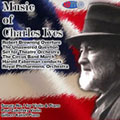 Iím
indebted to Dan Morgan for yet another review of an HDTT 24/96 download of
the music of Charles Ives. Iím not surpised at his enthusiasm, since it was
from Farbermanís Vanguard recordings that I first got to know Ives' symphonies:
Iím
indebted to Dan Morgan for yet another review of an HDTT 24/96 download of
the music of Charles Ives. Iím not surpised at his enthusiasm, since it was
from Farbermanís Vanguard recordings that I first got to know Ives' symphonies:
One of the joys of downloads is the ability to choose individual tracks from
a given album. Which is what I've done here, focusing on the orchestral pieces
- taken from a Vanguard master - and omitting the Sonata No. 1 for Violin
and Piano, transferred from a Nonesuch tape. As usual, HDTT offer the music
on physical media - CD and DVD - as well as a 24bit/96kHz flac download. Other
examples of the latter have impressed me very much indeed, especially the
Ansermet/OSR Bizet Symphony in C, which Brian Wilson nominated as his Download
of the Year.
So how does this collection stack up? The Royal Philharmonic needs no introduction,
but the conductor-composer Harold Farberman (b. 1929) is probably more familiar
to those who remember the early days of stereo. Heís a great advocate of Ivesís
music, so itís a real treat to hear him in these three - very different -
works. The Robert Browning Overture was intended as part of a series
devoted to 'Men of Literature', among them Walt Whitman and Matthew Arnold;
the latter overture, dated 1912, is incomplete.
The brooding start to the Browning piece makes a startling impression, the
stereo spread both broad and deep, the lower brass especially well caught.
The first big climax comes as a real shock, the piled dissonances and cross-rhythms
as challenging as anything Ives ever wrote. Yes, the upper strings are a little
bright and tuttis are somewhat strained, but the snare and bass drum have
plenty of impact. What strikes me most forcibly is the unfettered energy of
this recording, with no hint of compression or unnecessary spotlighting. An
Ivesian rarity, superbly played and presented.
After all that orchestral gnashing The Circus Band March will come
as something of a relief. Listening to the piece, and others, on a CD featuring
The Presidentís Own US Marine Band - review
- I longed for a more unbuttoned approach to Ivesís wilder works. And thatís
certainly what we get from Farberman and the RPO. The dynamics of this recording
are simply stunning. Actually, itís a tad unnerving at times, the transported
brass and thud of bass drum as visceral as anything you'd hear from a 21st-century
recording, let alone one made in 1964. Yes, there is some distortion - those
mighty drum thwacks come to mind - and thereís a slight left-right imbalance
at the start, but nothing detracts from the sheer, unbridled power of this
performance. Just fabulous.
The three interlinked sections of Set for Theatre Orchestra - In the
Cage, In the Inn and In the Night - show Ives in a darker, more restive mood.
Drumbeats and piano flourished dominate the first section - ostensibly inspired
by a caged leopard in Central Park - the ragged time of the second filtered
through Ivesís distinctive musical imagination. Farberman never loses his
grip on the orchestra, who play as if this were standard repertoire for them.
The final nachtmusik, with its tolling bells and slowing pulse, is
a piece of rare economy, a pared-down Tod und Verklãrung that
ends as enigmatically as it began.
On CD The Unanswered Question, probably Ivesís best-known work, gets
a finely calibrated performance from Leonard Bernstein and the New York Philharmonic
(DG 429 220-2). Itís long been my favoured version of this piece, and the
sonics aren't bad either. That said, I was chastened to discover that Farbermanís
version - a minute quicker than Bernsteinís - is far more atmospheric, the
ebb and flow of the piece very well managed. Indeed, I've never heard the
work sound quite so unsettling, the orchestral colours so vivid and tangible.
In fact, the full-bodied sound makes the DG recording seem anaemic by comparison;
as for Bernstein, he seems far too mannered - perhaps moulded is the better
word - alongside Farberman.
So, another must-hear from HDTT. For all their sonic virtues thereís no disguising
the age of these recordings - especially in the climaxes of the gnarly overture
and riotous march - but in return we get an aural buzz that even the best
modern recordings can't quite manage. What a pity that the downloadable cover
art - complete with glaring typo - and basic liner-notes let the side down.
Still, itís the music-making that really matters. Not to be missed.
Dan Morgan
Havergal BRIAN (1876-1972)
In Memoriam (1910) [18:50]
Festal Dance (1908) [6:16]
Symphony No. 17 (1960-1) [13:36]
Symphony No. 32 (1968) [20:56]
RTÉ National Symphony Orchestra/Adrian Leaper - rec. June 1992. DDD.
(from Marco Polo 8.223841)
NAXOS Tintner Edition 8.557242 [74:50] Ė from classicsonline.com
(mp3)
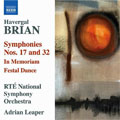 Naxos,
whose full-price label Marco Polo did so much to put Havergal Brianís music
on the map, continues to do sterling service in reissuing those recordings
at super-budget price. Itís now become a cliché to wonder why such
fine music was neglected for so long, thanks to the success of those Marco
Polo recordings with a wide range of orchestras. This is one of the best of
the series in every respect, joining Symphonies Nos. 11 and 15, etc., again
with the RTÉ Orchestra (8.572014 - see August 2010 Roundup), and the
mp3 sound does it full justice.
Naxos,
whose full-price label Marco Polo did so much to put Havergal Brianís music
on the map, continues to do sterling service in reissuing those recordings
at super-budget price. Itís now become a cliché to wonder why such
fine music was neglected for so long, thanks to the success of those Marco
Polo recordings with a wide range of orchestras. This is one of the best of
the series in every respect, joining Symphonies Nos. 11 and 15, etc., again
with the RTÉ Orchestra (8.572014 - see August 2010 Roundup), and the
mp3 sound does it full justice.
Arnold BAX (1883-1953) Piano Quintet in
g minor (1914-15) [41:10]
Frank BRIDGE (1879-1940) Piano Quintet
in d minor, H49a (1904/5, rec.1912) [27:08]
Ashley Wass (piano); The Tippett Quartet
rec. St Silas Church, Chalk Farm, London, 17-19 December, 2009. DDD.
NAXOS 8.572474 [68:18] Ė from classicsonline.com
(mp3)
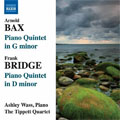 This
heartfelt performance of his powerful Piano Quintet adds considerably
to the Bax discography. The Quintet may not match his symphonies, but
it does deserve a place in the catalogue, where it was previously unrepresented.
Ashley Wass is rapidly making a name for himself with his recordings for Naxos,
to whom he is exclusively contracted, and he is well supported here by the
Tippett Quartet.
This
heartfelt performance of his powerful Piano Quintet adds considerably
to the Bax discography. The Quintet may not match his symphonies, but
it does deserve a place in the catalogue, where it was previously unrepresented.
Ashley Wass is rapidly making a name for himself with his recordings for Naxos,
to whom he is exclusively contracted, and he is well supported here by the
Tippett Quartet.
There are other recordings of the Bridge, notably from Piers Lane and the
Goldner Quartet (Hyperion CDA67726 - Recording of the Month here)
and Michael Dussek and the Bridge Quartet (Somm SOMM087 - see reviews here).
I havenít heard those rival recordings, but I was a little underwhelmed by
Wass and the Tippet Quartet after they had made such a strong case for the
Bax. Perhaps itís the rather rhapsodic nature of the Bridge, from whom one
expects something rather sharper, rather than the performance. I donít want
to make too much of my slight disappointment with the Bridge - try it for
yourself at the Naxos Music Library if possible - and, in any case, the performance
of the Bax justifies the modest cost of the download.
Mp3 only - no lossless version as yet - but the recording does the music and
performances full justice, even in that form.
As I am about to close this Roundup, I note that Ian Lace has chosen this
CD as his Recording of the Month - see review.
The Jazz Age for Piano Duo
George GERSHWIN (1898-1937)
An American in Paris (1928) - two-piano version arranged by Gershwin [18:37]
Edward Burlingame HILL (1872-1960)
Jazz Studies for two pianos (1922-24) [8:38]
Darius MILHAUD (1892-1974)
La création du monde (1922-23) - piano-duet version by Milhaud [15:43]
Alexander MOYZES (1906-1984)
Jazz Sonata for two pianos Op.14 (1932) [14:29]
Mátyás SEIBER (1905-1960)
Easy Dances for piano duet (1932) - selection of pieces [7:38]
Hoagy CARMICHAEL (1899-1981)
Stardust for two pianos (1927) arr. Louis Merkur (1895-1982) [4:13]
George GERSHWIN (1898-1937)
Embraceable You for piano duet (1928) arr. Percy Grainger (1882-1961)
[1:23]
Anthony Goldstone and Caroline Clemmow (piano duo)
rec. 2010, St. John the Baptist Church, Alkborough, North Lincolnshire. DDD.
DIVINE ART DDA25089 [70:43] Ė from theclassicalshop.net
(mp3)
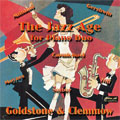 Jonathan
Woolfís review - here
- whetted my appetite, just as I was about to close the doors on this Roundup
- ĎThis is a sparkling and vivacious disc, marvellously played, and not just
for jazzers onlyí. I've had time for only a light sampling, but first impressions
are as favourable as JWís review suggests, with An American in Paris sounding
particularly fine in Gershwinís own two-piano arrangement. The recording is
very good in lossless format and the booklet, in pdf form, comes as part of
the deal. The innards turned out to be for the wrong recording, but I've informed
Chandos and Iím sure that will be put right.
Jonathan
Woolfís review - here
- whetted my appetite, just as I was about to close the doors on this Roundup
- ĎThis is a sparkling and vivacious disc, marvellously played, and not just
for jazzers onlyí. I've had time for only a light sampling, but first impressions
are as favourable as JWís review suggests, with An American in Paris sounding
particularly fine in Gershwinís own two-piano arrangement. The recording is
very good in lossless format and the booklet, in pdf form, comes as part of
the deal. The innards turned out to be for the wrong recording, but I've informed
Chandos and Iím sure that will be put right.
Dmitri SHOSTAKOVICH (1906 - 1975)
String Quartet No. 11 in f minor, Op. 122 (1966) [17:19]
String Quartet No. 13 in b flat minor, Op. 138 (1970) [18:47]
String Quartet No. 15 in e flat minor, Op. 144 (1974) [35:01]
St. Petersburg String Quartet. - rec. December 2000 - January 2001. DDD
HYPERION CDA67157 [71:21] Ė from Hyperion (mp3
and lossless)
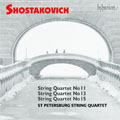 Like
the Haydn and Mozart CDs (above), this recording has fallen on hard times
and ended up through no fault of its own in the 'please buy me' category.
I can only echo Neil Hornerís recommendation - 'A superb achievement that
makes me want to hear the rest of the cycle as a priority' (see full review)
- and urge you to purchase this in one format or another.
Like
the Haydn and Mozart CDs (above), this recording has fallen on hard times
and ended up through no fault of its own in the 'please buy me' category.
I can only echo Neil Hornerís recommendation - 'A superb achievement that
makes me want to hear the rest of the cycle as a priority' (see full review)
- and urge you to purchase this in one format or another.
John ROSE (b.1928)
String Quartet No.1, Op.14 (1997) [21:09]
Prelude and Fugue, Op.20a (2001) [4:51]
Prelude and Two Fugues, Op.20b (2001) [10:50]
Essay on DSCH, Op.7 (1970) [11:13]
String Quartet No.2, Op.17 (1999) [26:06]
The Edinburgh Quartet (Tristan Gurney, Philip Burrin (violins); Michael Beeston
(viola); Mark Bailey (cello); Robert Melling (piano)) - rec. 2009. DDD
DIVINE ART DDA25092 [74:14] - from theclassicalshop.net
(mp3 and lossless)
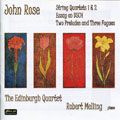 The
blurb for this recording advertises John Roseís music as 'embrac[ing] a post-modern
freedom - allowing him to build tonal and memorable music often with a strong
neo-baroque sound, strongly inspired by Bach - although Shostakovich is another
source of inspiration. This is not to limit his work which is varied and rich,
but emphasises his distinctive linear style'. Thatís essentially true, though
it perhaps plays down the occasional angularity - I think that I shall need
a little more time to absorb the idiom, but I especially enjoyed first encounters
with the String Quartets which book-end this album. Without scores, which
are published by Eden Music, I take the performances on trust as idiomatic
and the recording sounds well in download form.
The
blurb for this recording advertises John Roseís music as 'embrac[ing] a post-modern
freedom - allowing him to build tonal and memorable music often with a strong
neo-baroque sound, strongly inspired by Bach - although Shostakovich is another
source of inspiration. This is not to limit his work which is varied and rich,
but emphasises his distinctive linear style'. Thatís essentially true, though
it perhaps plays down the occasional angularity - I think that I shall need
a little more time to absorb the idiom, but I especially enjoyed first encounters
with the String Quartets which book-end this album. Without scores, which
are published by Eden Music, I take the performances on trust as idiomatic
and the recording sounds well in download form.
Theclassicalshop usually offer the booklets with Divine Art recordings, but
there is none in this case. Subscribers to the Naxos Music Library will find
it there, containing notes by the composer.
Edward GREGSON (b. 1945) Concertos
Trumpet Concerto (1983) [23:03]
Concerto for Piano and Wind: ĎHomagesí (1995, rev. 1997) [19:03]
Saxophone Concerto (2006) [24:00]
Ole Edvard Antonsen (trumpet) Nelson Goerner (piano) Nobuya Sugawa (saxophone)
BBC Philharmonic Orchestra/Clarke Rundell
rec. 11-12 September 2007, Studio 7, New Broadcasting House, Manchester, UK.
DDD.
CHANDOS CHAN10478 [65:53] from theclassicalshop.net
(mp3, lossless and Studio 24bit/96kHz)
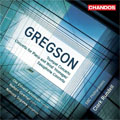 Iím
grateful to my colleague Dan Morgan for his review of this recording in 24-bit
format:
Iím
grateful to my colleague Dan Morgan for his review of this recording in 24-bit
format:
I first chanced upon the music of Edward Gregson in a high-resolution download
of his Trombone Concerto, played with astonishing maturity Ė and style
Ė by the young Peter Moore. That was a deserving Discovery of the Month Ė
review
Ė but is this set of three concertos in the same league?
The soloist in the Trumpet Concerto, Ole Edvard Antonsen, is aided
and abetted by timpanist and fellow protagonist Paul Turner. After a striking
timp-led start itís clear this is another well-balanced, atmospheric recording
from Studio 7. Antonsen is sensitive to the concertoís changing landscape,
lighting up the darkling plain of the Mesto, subtitled ĎIn Memoriam Dmitri
Shostakovichí, with his glowing timbres. As for Turner, he adds real menace
to the mix; indeed, as Iíve found in other high-res downloads from this source,
timps have a pleasing solidity and weight; as for the keening upper strings
in this movement, they sound suitably silky. Even in his taxing solos and
the animated writing of the final Vivo e brillante, Antonsen is a player
who doesnít distract or dominate; the result is an engaging and genuinely
collaborative performance.
The Concerto for Piano and Wind is no less appealing. The opening Toccata
is bright and mobile, angular rhythms rendered with great precision Ė and
feeling Ė by Nelson Goerner. Itís an intriguing aspect of Gregsonís musical
persona that even when the writing is virtuosic it retains a marvellous sense
of scale and focus, the soloist just another thread in a somewhat Bartůkian
tapestry. There are some delectable colours in the Passacaglia, the atavistic
writing of the Rondo-Burlesque overlaid by a patina of urban sophistication.
Itís a tricky juxtaposition, but with such committed playing it works a treat.
The piano is naturally balanced, the lower registers refulgent, the upper
ones nicely extended. Oh, if only more concertos were this sympathetically
presented.
The Saxophone Concerto, played by Nobuya Sugawa, boasts beautifully
sustained playing and deft articulation from the soloist. Thereís a smoky
languor to the work as well, the heated percussion and plucked basses adding
to its jazzy ambience. This is the most extrovert piece here, the BBC Phil
bringing an easy swing and sway to the mix. And in the moody monologues of
the second movement, Sugawa evokes the urban landscapes of Bernstein and Daugherty.
As before, the soloist is given a natural perspective, the answering calls
of the piano similarly well balanced. But itís the declamatory bass that is
most thrilling, a restless counterpoint to the eloquent Ė sometimes soaring
Ė line of the sax.
These are genial works, full of good tunes and good humour. Gregsonís colour
palette is subtle and varied as well, the nuances of his writing highlighted
by this recording. So, a worthy companion to the Trombone Concerto?
Oh, yes.
Dan Morgan
Royal Air Force: Music for Service Occasions
God Save the King; Edward ELGAR (1857-1934)
Land of Hope and Glory [3:31] - also on BEULAH EXTRA 1BX141*
Trumpet Calls of the RAF [2:53]
Henry Walford DAVIES (1869-1941) Royal
Air Force March (1918) [2:25]
General Salute; Duke of York March [2:57] - also on BEULAH EXTRA 4BX141*
Noel GAY (1898-1954) Fall in and Fly March
[3:06]
Rudolph O'DONNELL The Lad from London
Town - March [3:13]
National Anthems of Allied Squadrons - also on BEULAH EXTRA 7BX141*
[7:04]
Belgium - La Brabançonne [0:48]
Czechoslovakia - Kde domov můj? [1:21]
France - La Marseillaise [0:59]
Netherlands - Het Wilhelmus [0:43]
Norway - Ja, vi elsker dette landet [0:48]
Poland - Mazurek Dąbrowskiego [0:50]
USA - The Star-Spangled Banner [1:04]
Roast beef of old England [0:51] - also on BEULAH EXTRA 14BX141*
Harry PARR-DAVIES (1914-1955) Itís in
the Air [2:20]
Émile WALDTEUFEL (1837-1915) España
waltz Op.236 (1886) [3:22] - also on BEULAH EXTRA 16BX141*
Giacomo PUCCINI (1858-1924) Madama
Butterfly: orchestral selection [6:34]
Eric COATES (1886-1957) Song of Loyalty
[3:22]; Over to You [3:16]
Percy FLETCHER (1879-1932) A Sentimental
Sea Shanty [3:21] - also on BEULAH EXTRA 20BX141*
John Mackenzie ROGAN (1855-1931) Festival
of Empire [3:24] - also on BEULAH EXTRA 21BX141*
Choruses: She'll be comin' round the mountain; I've got sixpence; Bless 'em
all; Here comes the RAF; Fed up and far from home; Roll out the barrel [5:33]
Sunday Evening:
William BOYD Fight the Good Fight (1864)
[2:52] - also BEULAH EXTRA 23BX141*
William Henry MONK (1823-1889) Abide with
me [3:22] - also BEULAH EXTRA 24BX141*
Central Band of the RAF; RAF Orchestra; RAF Dance Band; RAF Chorus/Wing Commander
R.P. OíDonnell, MVO. - rec. 1941. ADD/mono
BEULAH 1PD41 [63:19] Ė from iTunes
(mp3)
Tracks marked * also available as Beulah Extra downloads. Details from Beulah,
with notes on the music.
Lancaster Fly Past (sound clip)
BEULAH EXTRA 25BX141 [2:51] Ė from Beulah
(mp3)
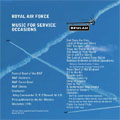 I
imagine that this album, taken from 78s released in 1941, is designed to appeal
to those who did their National Service in the RAF - this will be especially
the case with the 3 minutes of trumpet calls and the General Salute. As a
member of one of the first year-groups not to be called up, but assured by
undergraduate friends that Arnold Weskerís Chips with Everything was a pretty
accurate reflection of their National Service, Iím afraid that much of that
appeal is lost on me. The same goes for the anthems of allied nations: the
number of those who served in the Belgian and other forces in exile in the
UK must be dwindling. Those to whom the programme appeals, however, can be
assured that everything here is well transferred, with almost no surface noise
and with the 1941 sound brushed up well enough to provide no serious obstacle
to listening pleasure.
I
imagine that this album, taken from 78s released in 1941, is designed to appeal
to those who did their National Service in the RAF - this will be especially
the case with the 3 minutes of trumpet calls and the General Salute. As a
member of one of the first year-groups not to be called up, but assured by
undergraduate friends that Arnold Weskerís Chips with Everything was a pretty
accurate reflection of their National Service, Iím afraid that much of that
appeal is lost on me. The same goes for the anthems of allied nations: the
number of those who served in the Belgian and other forces in exile in the
UK must be dwindling. Those to whom the programme appeals, however, can be
assured that everything here is well transferred, with almost no surface noise
and with the 1941 sound brushed up well enough to provide no serious obstacle
to listening pleasure.
In fact, I have an ideal audience in mind for much of the music here Ė a group
of elderly patients in my local hospital to whom I play music of the 1940s,
1950s and 1960s to get their brains active Ė Iím sure theyíll love the likes
of Bless Ďem all and Roll out the barrel. (Come to that, they
got my feet tapping too). Anything by Eric Coates is guaranteed to be of high
quality, but poor old Waldteufel has become something of a lost cause these
days Ė what happened to the Skaterís Waltz, apart from its inclusion
in A Late Romantic Christmas Eve (Ars 38086, see review)?
Ė so Iím pleased to see his EspaŮa here, even though he did steal most
of the music from Chabrier. Marco Polo have done Waldteufel proud with a series
of recordings, highlights of which are also available on Naxos 8.553956: Passionato
have these and other downloads of his music here.
Tasty Christmas Leftovers
Christmas Goes Baroque Volume 1
Slovak State Philharmonic Orchestra, Kosice/Peter Breiner - rec. 1991. DDD.
NAXOS 8.550301 [63:31] Ė from classicsonline.com
(mp3)
Piæ Cantiones - Early Finish Vocal Music (1582)
Finnish Radio Choir/Timo Nuoranne - rec.1998. DDD.
ONDINE ODE918-2 [67:42] Ė from Passionato.com
(mp3 and lossless) or classicsonline.com
(mp3)
Piæ Cantiones - Latin Songs in Medieval Finland
Retrover Ensemble/Markus Tapio - rec. 1997. DDD.
NAXOS 8.554180 [62:11] Ė from classicsonline.com
and Passionato.com (both mp3)
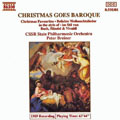 Apologies
for having missed both the December Roundup and the Christmas Supplement with
these - I hope that this Roundup will appear in time for you to play Christmas
Goes Baroque until Twelfth Night and the Piæ Cantiones contain
music for all year round - indeed, much of the music, as might be expected
for a Scandinavian collection, is about Spring. There is, however, also a
good deal of Christmas music, including one of the earliest examples of Personent
hodie.
Apologies
for having missed both the December Roundup and the Christmas Supplement with
these - I hope that this Roundup will appear in time for you to play Christmas
Goes Baroque until Twelfth Night and the Piæ Cantiones contain
music for all year round - indeed, much of the music, as might be expected
for a Scandinavian collection, is about Spring. There is, however, also a
good deal of Christmas music, including one of the earliest examples of Personent
hodie.
Christmas Goes Baroque continues the work begun in Beatles Go Baroque,
with familiar Christmas Carols undergoing the treatment. I thought it less
successful than the Beatles album, largely because many traditional seasonal
tunes already have a baroque feel, so donít sound greatly altered in these
arrangements, but itís great fun.
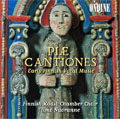 The
lack of texts is the only problem connected with both downloads of Piæ
Cantiones: some of the Latin ones are available online, but your Finnish would
have to be much better than mine to cope with the songs in that most difficult
of languages on the Ondine album. You can, however, obtain some information
on Piæ Cantiones from Naxos here. Both albums contain excellent performances,
the Naxos with significantly smaller forces, which I prefer as leading to
clearer diction and a more 'authentic'
The
lack of texts is the only problem connected with both downloads of Piæ
Cantiones: some of the Latin ones are available online, but your Finnish would
have to be much better than mine to cope with the songs in that most difficult
of languages on the Ondine album. You can, however, obtain some information
on Piæ Cantiones from Naxos here. Both albums contain excellent performances,
the Naxos with significantly smaller forces, which I prefer as leading to
clearer diction and a more 'authentic' 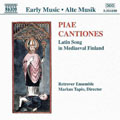 sound.
I place the word in quotes because we have little idea how the music sounded
in 16th-century Scandinavia. One track on the Ondine recording is accompanied
with percussion. The Naxos recording begins with a hauntingly beautiful organ
preamble; some of the pieces are lightly accompanied and there are some charming
instrumental interludes. Both sound well, even though the Naxos is available
in mp3 only.
sound.
I place the word in quotes because we have little idea how the music sounded
in 16th-century Scandinavia. One track on the Ondine recording is accompanied
with percussion. The Naxos recording begins with a hauntingly beautiful organ
preamble; some of the pieces are lightly accompanied and there are some charming
instrumental interludes. Both sound well, even though the Naxos is available
in mp3 only.
Classicsonline also have a third album from Piæ Cantiones on
the Musica Sveciæ label (Hortus Musicus/Andres Mustonen, MSCD201)
and both classicsonline and passionato have a fourth collection, from 1995,
sung by the female voices of Oxford Camerata directed by Jeremy Summerly (Let
Voices Resound, Naxos 8.555578). Perhaps Iíll return to them in
time for next Christmas.
Brian Wilson
